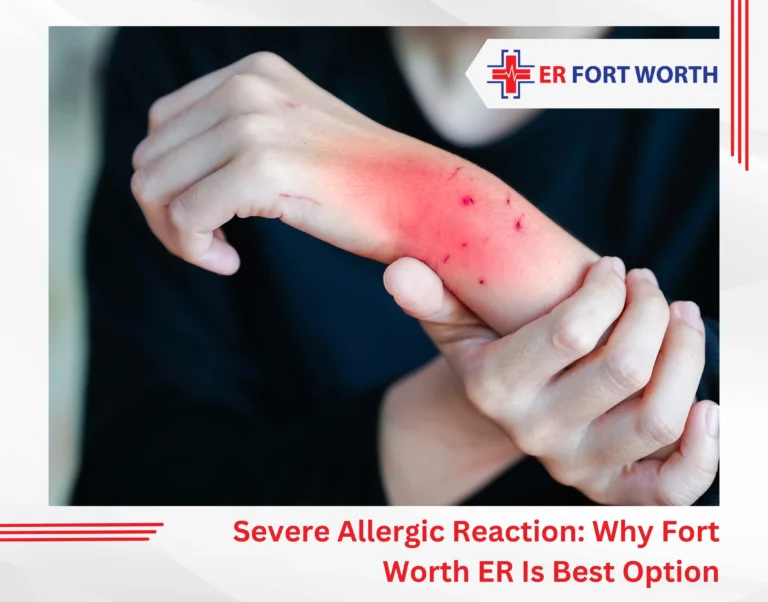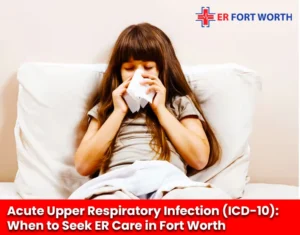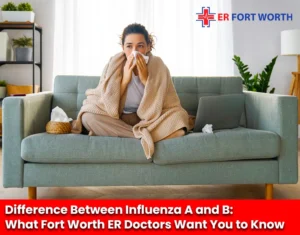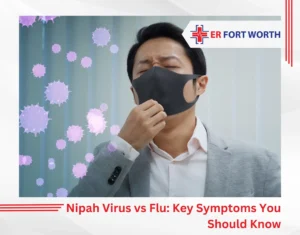Every year, hundreds of Fort Worth residents end up in our ER because of severe allergic reactions. And it isn’t just cedar fever and oak pollen, certain foods, medications, insect stings, and other triggers can turn an ordinary day into an emergency.
Symptoms like a sudden rash, throat tightness, or dizziness might seem mild at first, but they can explode into full-blown anaphylaxis in minutes. Too often, people delay seeking care and rely on home remedies while the clock ticks. We see these scenarios daily in our Fort Worth ER.
When it comes to severe allergic reactions, knowing when and where to get help is non-negotiable. Let’s explore how our experienced team in Fort Worth ER provides emergency care for severe allergic reactions.
What Is a Severe Allergic Reaction?
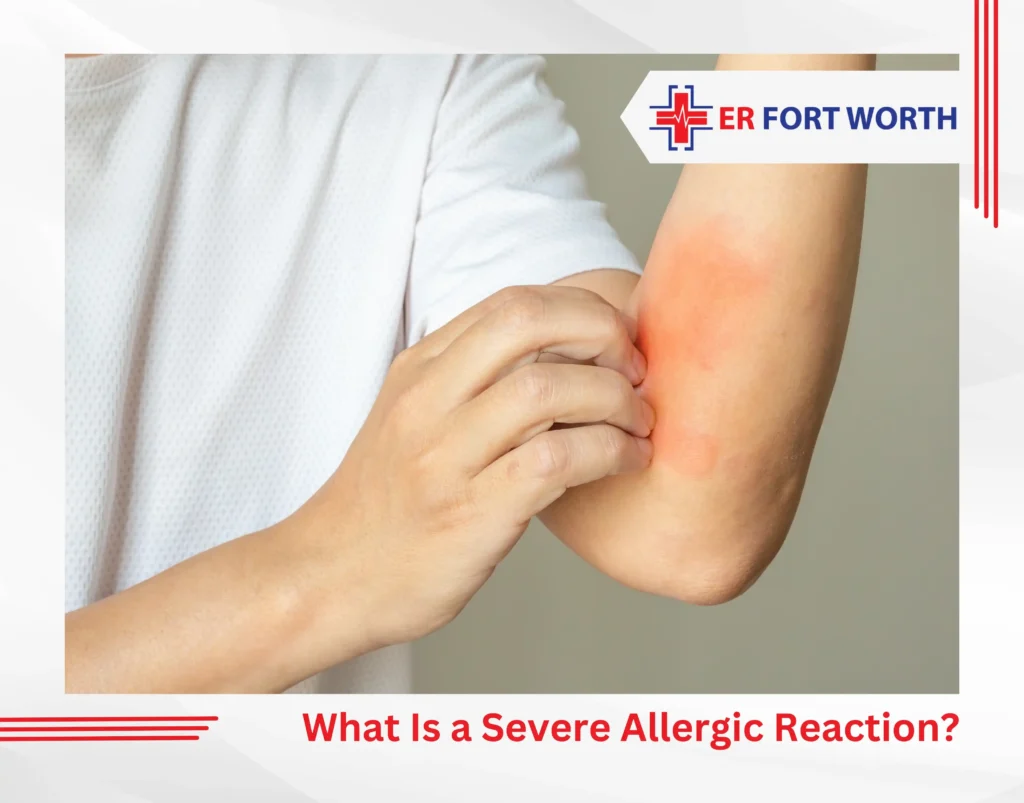
A severe allergic reaction, or anaphylaxis, happens when the immune system reacts excessively to a normally harmless substance, such as certain foods, medications, or insect stings. This heightened response can lead to symptoms that impact various body systems, necessitating urgent medical care.
Common Triggers of Severe Allergies
- Foods (e.g., peanuts, shellfish, milk)
- Medications (e.g., antibiotics, aspirin)
- Insect stings (e.g., bees, wasps)
- Latex or specific chemicals
Symptoms of Severe Allergic Reactions
- Difficulty breathing
- Swelling of the face, throat, or tongue
- Rapid heartbeat or weak pulse
- Severe hives or rash
- Dizziness or fainting
- Gastrointestinal issues like nausea or vomiting
Why You Should Go to the ER for Severe Allergic Reaction
If you think you might be experiencing anaphylaxis, going to the emergency room is the best choice. Symptoms can escalate rapidly, potentially leading to airway blockage, shock, or cardiac failure.
Here’s why urgent medical attention is vital:
Access to Advanced Treatments
- Epinephrine Administration: The primary treatment to alleviate symptoms
- Airway Support: Equipment like oxygen masks or intubation to assist with breathing
- IV Fluids and Medications: To help stabilize blood pressure and manage swelling
Comprehensive Monitoring
- Anaphylaxis can have a biphasic reaction, meaning symptoms may return hours after the initial episode. The ER provides continuous monitoring to ensure patient safety during this critical window.
Specialized Care Team
- Emergency room doctors are trained to recognize and treat the specifics of severe allergic reactions. They can also decide if additional tests or hospitalization is required.
Why You Shouldn’t Manage Severe Allergic Reactions at Home
While mild allergic responses can frequently be handled with over-the-counter antihistamines, serious reactions need professional attention. Postponing treatment or depending solely on home remedies can lead to disastrous outcomes. For instance:
- A self-administered epinephrine shot buys time but does not substitute the necessity for medical care.
- Symptoms may intensify unexpectedly, providing little opportunity for intervention outside a healthcare environment.
Managing allergic reactions promptly is crucial to preventing complications. Treatment options depend on the severity of the reaction.
What to Expect During an ER Visit for Severe Allergic Reactions
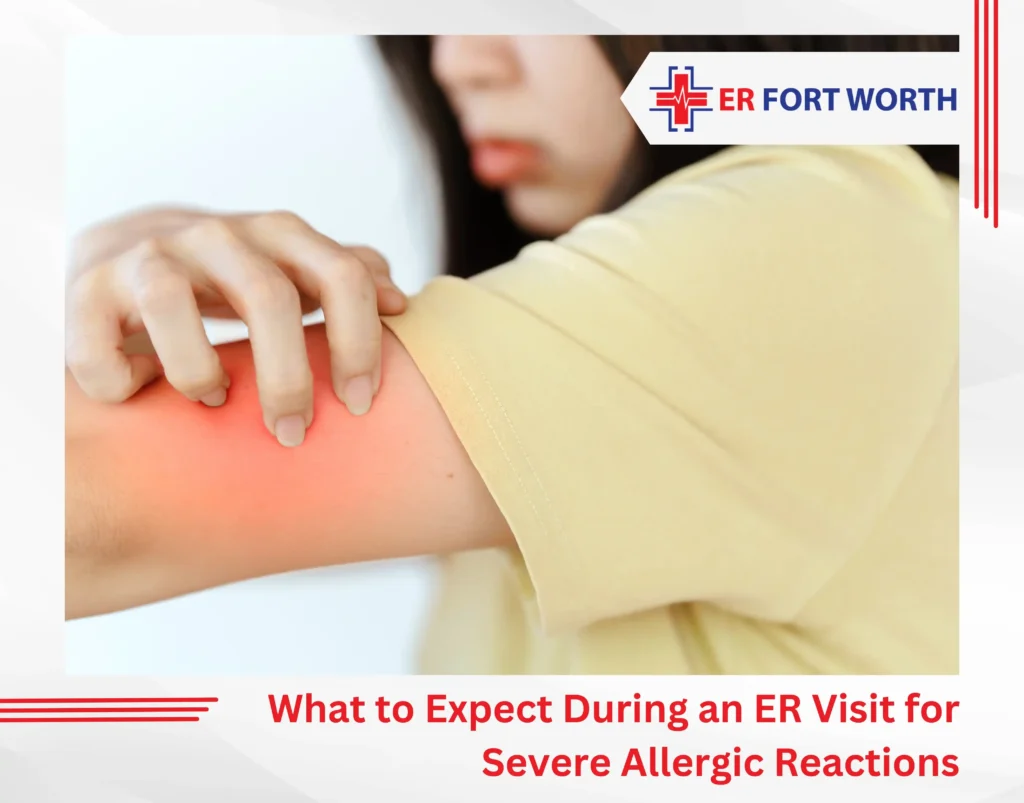
When facing a severe allergic reaction (anaphylaxis), it’s vital to seek emergency care. At ER of Fort Worth, we follow a systematic approach to provide swift and effective treatment. Here’s what happens step by step:
Initial Triage and Evaluation
Upon your arrival, your case is prioritized based on the seriousness of your symptoms. The ER staff will:
- Assess Symptoms: Identifying indications like swelling, trouble breathing, or rash.
- Check Vital Signs: Monitoring blood pressure, heart rate, oxygenation, and temperature.
- Ask About Triggers: Inquiring about recent food, medications, insect stings, or other exposures.
This quick evaluation assists in identifying life-threatening conditions needing immediate intervention.
Emergency Actions
During severe allergic reactions, time is crucial. The medical team may:
- Administer Epinephrine: A life-saving medication to reverse anaphylaxis symptoms
- Assist Breathing: Providing oxygen or inserting an airway tube if swelling obstructs airways
- Initiate IV Fluids: Stabilizing blood pressure and avoiding shock
- Employ Additional Medications: Administering antihistamines or corticosteroids to decrease inflammation and allergic responses
These measures stabilize your situation and avert complications. Remember to always consult your doctor before taking any medications.
Observation and Monitoring
After the initial treatment, the team will observe you for several hours to:
- Monitor for Biphasic Reactions: A secondary wave of symptoms can occur after the initial response relieves.
- Reassess Stability: Ensuring your breathing, vital signs, and symptoms stay controlled.
Discharge or Hospitalization
Once stabilized, the next steps depend on your recovery:
- Discharge Plan: If symptoms completely resolve, you’ll receive thorough aftercare directions, including prescriptions and emergency management guidance.
- Hospital Admission: For severe or recurring symptoms, you may be admitted for further observation or advanced care.
The primary focus is on ensuring your safety both during and after your visit.
Proactive Measures to Prevent Serious Allergic Reactions
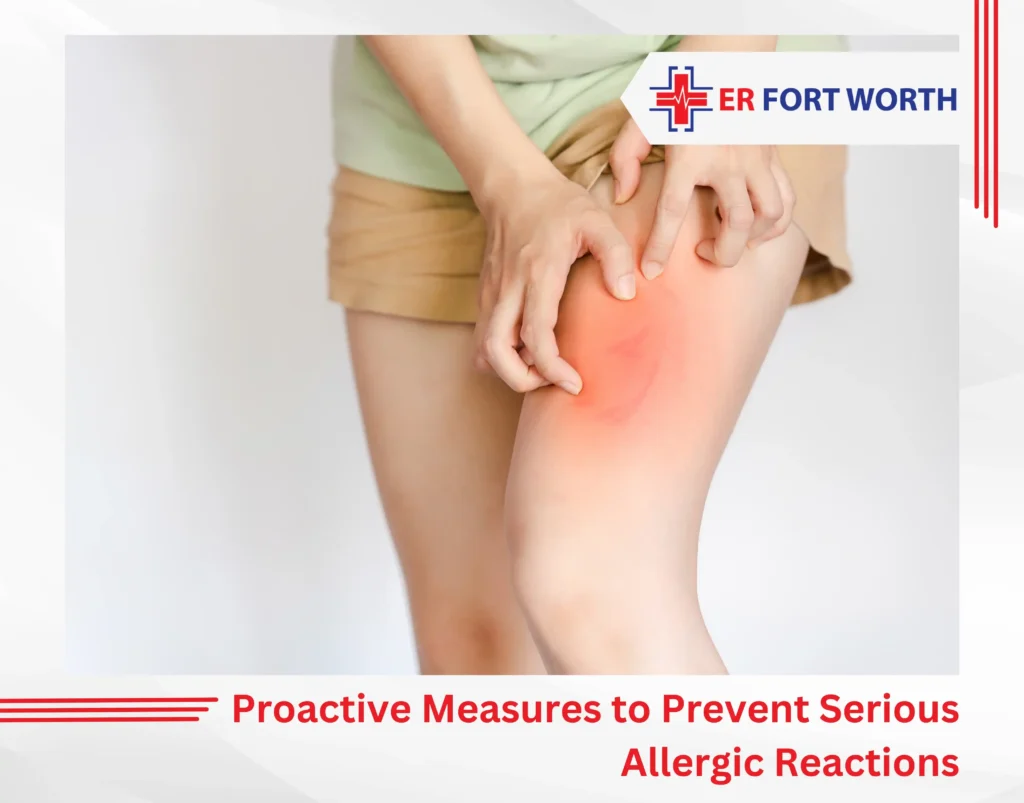
While the emergency room offers essential care, preventing allergic reactions is the most effective strategy. Here are practical steps to lower your risk:
Recognize and Handle Triggers
- See an Allergist: Get tested to identify specific allergens, whether they are food, medication, or environmental influences.
- Record Reactions: Keep a comprehensive log of previous allergic incidents to discuss with healthcare professionals.
Carry Emergency Medications
- Epinephrine Auto-Injector: Always carry a prescribed device like an EpiPen, and ensure that close acquaintances know how to operate it.
- Regular Medication Inspections: Verify that your epinephrine is not past its expiration date and is stored correctly.
Wear a Medical Alert Identification
- A bracelet or necklace can notify bystanders and emergency responders about your allergy, facilitating quicker treatment during emergencies.
Steer Clear of High-Risk Scenarios
- Food Safety: Examine food labels carefully and communicate your allergies when eating out.
- Outdoor Safety Measures: Use insect repellents and wear protective garments to avoid stings.
- Medication Awareness: Talk about potential cross-reactive medications with your healthcare provider.
Inform Those Around You
- Educate Close Contacts: Teach family, friends, and coworkers how to recognize symptoms of anaphylaxis and how to administer epinephrine.
- Emergency Protocols: Create a clear action plan and inform those who might help in an emergency.
At the ER of Fort Worth, we provide immediate care for severe allergic reactions in both children and adults. Our emergency team combines advanced allergy testing with experienced judgment to quickly identify and stop dangerous reactions before they worsen.
From first-time reactions that catch families off guard to known allergies that suddenly turn severe, we’re ready 24/7 with the specialized care that makes the difference in those critical moments. If you notice signs of a severe allergic reaction, don’t wait – our Fort Worth ER team is here with the expertise and treatments you need.
FAQs
What is considered a serious allergy?
A serious allergy, i.e. anaphylaxis, is a life-threatening reaction that can occur within seconds or minutes after exposure to an allergen. Symptoms include difficulty breathing, throat swelling, and a drop in blood pressure.
What to drink for allergies?
Herbal teas like nettle and ginger tea can reduce allergy symptoms due to their anti-inflammatory properties.
Which soap is best for allergy skin?
Hypoallergenic and gentle soaps are recommended for sensitive skin as they minimize irritation and avoid harsh chemicals.

